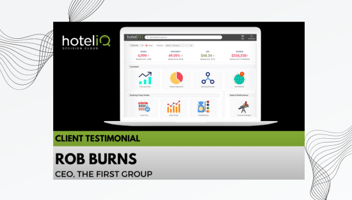Emaar Hospitality Group Develops Unparalleled Analytical Capabilities with HotelIQ
Read MoreTable of Contents
A case study exploring how strategic technology integration between HotelIQ and SHR RMS enabled rapid growth and operational efficiency for a leading hospitality group in one of the world's most competitive markets.
In the ultra-competitive Dubai hospitality market, staying ahead requires more than just exceptional service – it demands intelligent, data-driven decision-making at lightning speed. For The First Group Hospitality (TFG), a rapidly expanding hotel portfolio, the journey from manual revenue management to sophisticated AI-powered intelligence represents a transformation that's reshaping how they compete and grow.
This case study, featuring insights from Muhammad Hamoud (Head of Revenue Management Analytics at TFG), demonstrates what happens when cutting-edge technology meets hospitality expertise.
Challenge
When Muhammad Hamoud joined TFG, bringing over 16 years of experience from sophisticated operations like Marriott International, he encountered a revenue management landscape that was fundamentally different from what he knew. The challenges were multifaceted and urgent:
Manual Pricing Bottlenecks: TFG's properties were operating with basic or outdated systems, with some relying entirely on manual pricing processes. Revenue managers were manually adjusting room types, rate changes, and forecasting across an expanding portfolio without any automation support.
Market Speed vs. Operational Pace: Dubai's hospitality market moves at breakneck speed, but TFG's manual processes couldn't keep up. As Hamoud noted, "By the time a team priced one hotel for the year, the market had already shifted." This disconnect meant missed revenue opportunities and reactive rather than proactive pricing strategies.
Scalability Constraints: With an ambitious growth trajectory, TFG needed systems that could scale rapidly. Manual processes that might work for a handful of properties would become impossible to manage as the portfolio expanded.
New Property Onboarding: Without historical data, new properties faced extended periods of suboptimal pricing while waiting for enough data to "warm up" their revenue management approaches.
Team Efficiency: Revenue management teams were spending the majority of their time on data input rather than strategic analysis and decision-making, limiting their ability to add real value to the business.
Solution
TFG's transformation centered on a powerful integration between two best-in-class platforms: HotelIQ's decision intelligence platform and SHR's Revenue Management System (RMS). This wasn't just a technology upgrade – it was a complete reimagining of how revenue management could work.
The HotelIQ Foundation: Since 2022, TFG had been leveraging HotelIQ's analytics capabilities for channel analysis, lead time insights, and business mix reviews. This established foundation provided the analytical backbone needed for sophisticated decision-making.
SHR RMS Integration: The missing piece was a revenue management system that could match TFG's ambitions. SHR RMS was selected for its exceptional flexibility and real-time capabilities. Key features included:
- Granular Control: The ability to price room types by supplement, adjust pricing by child or second adult, and maintain detailed control over pricing strategies
- Real-Time Responsiveness: Unlike systems that take hours or days to reflect changes, SHR RMS adapts dynamically, allowing teams to see live pickup responses within hours
- Advanced Machine Learning: For new properties without historical data, the system leverages sophisticated algorithms to borrow data patterns from comparable properties and markets
Gradual Implementation Strategy: Rather than attempting a wholesale transformation, Hamoud implemented a strategic rollout approach. Properties were transitioned one at a time, allowing teams to witness success firsthand and building internal momentum for change.
Human-AI Collaboration: The solution wasn't about replacing human expertise but amplifying it. SHR's Strategy Builder allows teams to insert local knowledge and commercial constraints into the system's logic, ensuring that AI recommendations align with business strategy and market realities.
Impact
The results of TFG's revenue management transformation have been both immediate and far-reaching:
Operational Efficiency: Teams shifted from spending hours on manual data input to focusing on analysis and strategic decision-making. This fundamental change allowed revenue managers to add significantly more value to the business.
Forecast Accuracy: The integrated system achieved remarkable forecast accuracy with a margin of just 1.4%, providing general managers with the confidence to trust and act on system recommendations.
Rapid Scaling: TFG successfully onboarded three new properties in just three months – a timeline that would have been impossible with manual processes. The system's ability to adapt quickly without waiting for historical data to accumulate was crucial to this success.
Cultural Transformation: Perhaps most importantly, the implementation drove a cultural shift within the organization. Teams who initially relied on manual processes became advocates for the new approach. As Hamoud noted with a smile, "Now they forget they ever priced manually."
Market Responsiveness: In Dubai's fast-moving market, the ability to react to changes within hours rather than days or weeks has translated directly into captured revenue opportunities that would have been missed under the previous system.
General Manager Confidence: The improved accuracy and reliability of recommendations led to increased trust from general managers, creating a positive feedback loop that enhanced the overall effectiveness of revenue management strategies.
Strategic Enterprise Oversight: Beyond tactical pricing improvements, the integrated platform provides enterprise-level visibility and control, enabling more sophisticated portfolio management strategies.
Conclusion
The First Group Hospitality's journey from manual revenue management to AI-powered intelligence offers a compelling blueprint for hospitality companies navigating digital transformation. The case demonstrates several critical success factors:
Integration Over Isolation: The power came not from any single technology but from the thoughtful integration of complementary platforms. HotelIQ's analytical capabilities combined with SHR RMS's real-time pricing created a solution greater than the sum of its parts.
Human-Centric AI: Rather than replacing human expertise, the most successful implementations augment and amplify human decision-making. The Strategy Builder functionality ensures that local knowledge and commercial intuition remain central to the process.
Gradual Transformation: Change management was as important as technology selection. The property-by-property rollout allowed teams to build confidence and competence gradually, ensuring sustainable adoption.
Market-Specific Solutions: In high-velocity markets like Dubai, the ability to respond to changes in real-time isn't just advantageous – it's essential. The solution's responsiveness directly addressed this market reality.
For hotel revenue leaders and general managers, TFG's transformation highlights a fundamental truth about the future of hospitality: automation doesn't replace expertise – it amplifies it. When sophisticated systems are paired with experienced minds and implemented thoughtfully, the result is smarter, faster, and more profitable decision-making.
As TFG continues to expand, their integrated revenue management platform scales with them, providing not just tactical pricing support but strategic, enterprise-level intelligence. In an industry where margins matter and markets move fast, this combination of human intelligence and AI capability represents the competitive edge that separates leaders from followers.
The hospitality industry's digital future isn't about choosing between human expertise and artificial intelligence – it's about combining them in ways that unlock potential neither could achieve alone.
%20(1).png?width=400&height=124&name=21051_HotelIQ_logo_BJ_PB_DM_GR-05%20(1)%20(1).png)



Comments